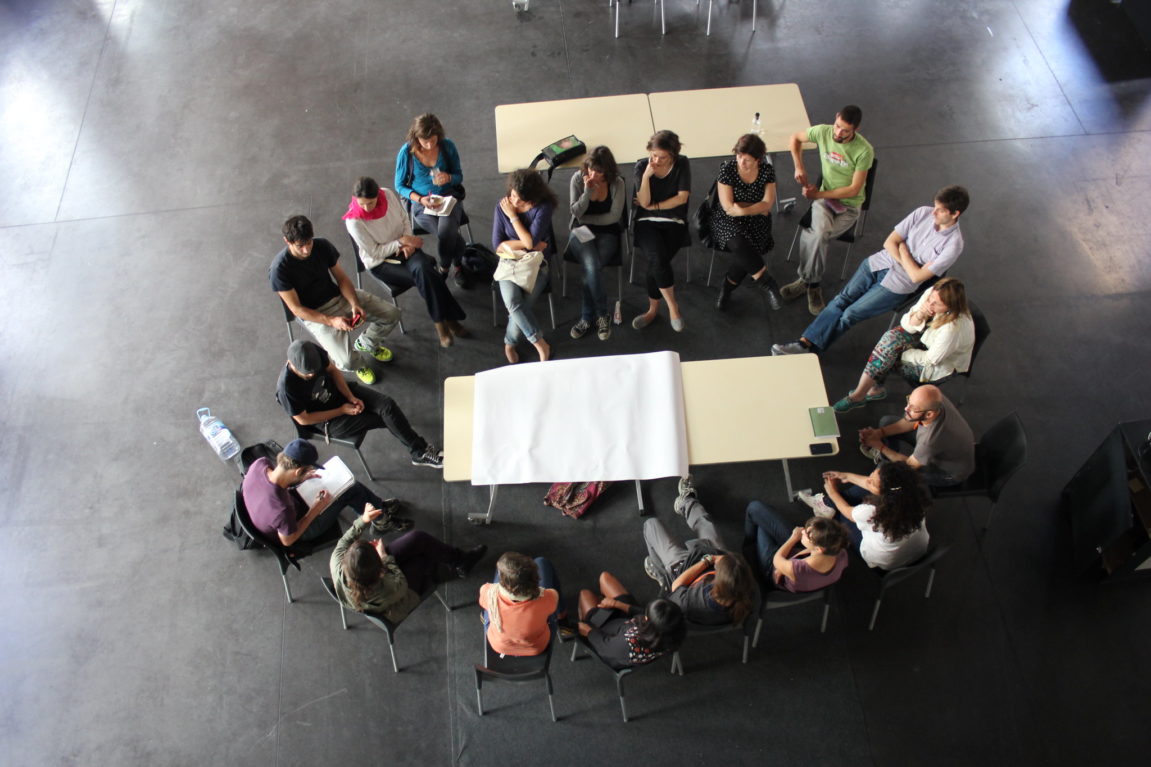Special issue curated by Tomás Criado (UOC) & Julio Paulos (ETH Zurich)
At a time when market logics have become the hegemonic operating rationale of many governments, some public officers and bureaucrats worldwide seem to have undergone their own revolution in recent decades. At times referred to as a ‘creative turn’ in their practice (as in the annual Creative Bureaucracy Festival), at other times discussed as part of a ‘new municipalist’ transformation of public action (Bianchi 2022), urban bureaucracies seem to be going through a profound process of reinvention, seeking to renew their tools and approaches: from participatory budgeting or community involvement in policymaking to co-creation competitions and citizen laboratories that expand the range of knowledge and sensibilities in urban governance. As if Paul du Gay’s praise for their work (du Gay, 2000; Pedersen & du Gay, 2020) had caught on in the public sector, bureaucrats in many of these cases appear no longer as sinister machinic operators of Kafkaesque state violence, but as hopeful and flexible practitioners promoting many forms of public good. In our view, such ‘bureaucratic reinventions’ demand the attention of scholars interested in “material cultural practice in the organisation of the economy and the social” – one of JCE’s main aims – in at least two ways.
On the one hand, in line with relevant material-semiotic accounts of the practices of government (Hull, 2012a & 2012b) and the law (Kang, 2018; Kang & Kendall, 2019), how might we make these bureaucratic reinventions amenable to agnostic ethnographic study? This may require close attention to the ways in which bureaucrats in different sectors and departments deploy different legal and economic devices in different attempts at relational planning (Kurath, Marskamp, Paulos & Ruegg, 2018), on different issues in different places. Such attention to ‘bureaucratic reinventions’ would be an interesting way of empirically refocusing the much interesting work on market arrangements (Callon, 2021) – especially those interested in the specificity of economic arrangements for shared concerns (Frankel, Ossandón & Pallesen, 2019), as well as the predicaments markets face in ‘problem-solving’ (Neyland, Ehrenstein & Milyaeva, 2019) – for contemporary forms of government. In what ways are these bureaucratic reinventions more conducive to the public good than the actions of the market? To what extent might they be ‘performing different economies’ (Roelvink, St. Martin & Gibson-Graham, 2015) beyond the market?
On the other hand, we suggest that these bureaucratic reinventions alter the ways in which social researchers can approach these spaces or find ways to become relevant to them. Beyond critical takes or consultancy work, how might bureaucratic reinventions signal a new paradigm for research? Drawing on the work of Douglas Holmes and George Marcus (2005) on ‘para-sites’ – places of the contemporary populated by epistemic communities interested in inquirying on similar topics to researchers, and with whom ethnographers can enter in collaborative relations – what do these places mean for the ways in which we might study them? Indeed, various colleagues are also immersing themselves in the creative ethos of these renewed bureaucracies, experimenting with forms of joint problem-making (Estalella & Criado, 2018), sometimes drawing on cultural practitioners and the arts to explore other forms of relevance.
With this double lens, in this special issue we are inviting papers paying detailed ethnographic attention to (i) the assemblages and devices of peculiar bureaucratic reinventions and the forms of government there emerging, their predicaments and problems, as well as (ii) the singular research engagements that they might bring to the fore. As indicated above, these approaches will help us to shed light on the reorganisation of the social and the economic, while at the same time addressing an object of research, the city, which has long been approached and criticised as an arena of corporate entrepreneurship (Harvey, 1989; Jessop, 2003), neoliberal development (Graham and Marvin, 2001; Graham et al., 2019), and financialised activity (Aalbers, 2019).
This SI is to be submitted for the Journal of Cultural Economy‘s consideration.
Abstract submission
Please submit your 400-word abstract (excluding references) and biography (up to 250 words) to tomcriado AT uoc.edu and julio.paulos AT arch.ethz.ch by July 5, 2024.
Selected authors will be expected to submit a full draft of their paper by 15 February, 2025.
Timeline
- Reception of abstracts: July 5th, 2024
- Selection (Notification of acceptance): September 6th, 2024
- Authors’ workshop with draft papers: March 2025
- Initial manuscripts for editorial comment: April-May 2025
- Submission of special issue for JCE review: July 2025
References
Aalbers, M.B. 2020. Financial Geography III: The Financialization of the City. Progress in Human Geography 44(3): 595–607.
Bianchi, I. 2023. The Commonification of the Public under New Municipalism: Commons–State Institutions in Naples and Barcelona. Urban Studies 60 (11): 2116–32.
Callon, M. (2021). Markets in the Making: Rethinking Competition, Goods, and Innovation. Zone Books.
du Gay, P. (2000). In Praise of Bureaucracy: Weber, Organization, Ethics. Sage.
Estalella, A. & T. S. Criado (2018) (Eds.). Experimental Collaborations: Ethnography through Fieldwork Devices. Berghahn.
Frankel, C., Ossandón, J., & Pallesen, T. (2019). The organization of markets for collective concerns and their failures. Economy and Society, 48(2), 153–174.
Graham, S., & Marvin, S. (2001). Splintering Urbanism: Networked Infrastructures, Technological Mobilities, and the Urban Condition. Routledge.
Graham, M., Kitchin, R., Mattern, S., & Shaw, J. (Eds.). (2019). How to Run a City like Amazon, and Other Fables. Meatspace.
Harvey, D. (1989). From Managerialism to Entrepreneurialism: The Transformation in Urban Governance in Late Capitalism. Human Geography, 71(1), 3–17.
Hull, M. S. (2012a). Documents and Bureaucracy. Annual Review of Anthropology, 41, 251–267.
Hull, M. S. (2012b). Government of Paper: The Materiality of Bureaucracy in Urban Pakistan. University of California Press.
Jessop, B. (2003). The Future of the Capitalist State. Polity Press.
Kang, H. Y. (2018). Law’s materiality. In Routledge Handbook of Law and Theory (pp. 453–474). Routledge.
Kang, H. Y., & Kendall, S. (2019). Introduction to the special issue “Legal Materiality.” Law Text Culture, 23, 1–15.
Kurath, M., Marskamp, M., Paulos, J., & Ruegg, J. (Eds.). (2018). Relational Planning: Tracing Artefacts, Agency and Practices. Springer.
Holmes, D. R., & Marcus, G. E. (2005). Cultures of Expertise and the Management of Globalization: Toward the Re-Functioning of Ethnography. In A. Ong & S. J. Collier (Eds.), Global Assemblages: Technology, Politics, and Ethics as Anthropological Problems (pp. 235–252). Blackwell.
Neyland, D., Ehrenstein, V., & Milyaeva, S. (2019). Can markets solve problems? An empirical inquiry into neoliberalism in action. Goldsmiths Press.
Pedersen, K. Z., & du Gay, P. (2021). COVID-19 and the Flexibility of the Bureaucratic Ethos. In J. Waring, J.-L. Denis, A. R. Pedersen, & T. Tenbensel (Eds.), Organising Care in a Time of Covid-19 (pp. 99–120). Palgrave Macmillan.
Roelvink, G., St. Martin, K., & Gibson-Graham, J. K. (Eds.). (2015). Making Other Worlds Possible: Performing Diverse Economies. Minnesota University Press.
Picture
CC BY SA Medialab-Prado Foodlab 2014

